De Amerikaanse dichter, schrijver, filosoof en essayist Ralph Waldo Emerson werd geboren in Boston, Massachusetts op 25 mei 1803. Zie ook alle tags voor Ralph Waldo Emerson op dit blog.
My Garden
If I could put my woods in song
And tell what’s there enjoyed,
All men would to my gardens throng,
And leave the cities void.
In my plot no tulips blow,–
Snow-loving pines and oaks instead;
And rank the savage maples grow
From Spring’s faint flush to Autumn red.
My garden is a forest ledge
Which older forests bound;
The banks slope down to the blue lake-edge,
Then plunge to depths profound.
Here once the Deluge ploughed,
Laid the terraces, one by one;
Ebbing later whence it flowed,
They bleach and dry in the sun.
The sowers made haste to depart,–
The wind and the birds which sowed it;
Not for fame, nor by rules of art,
Planted these, and tempests flowed it.
Waters that wash my garden-side
Play not in Nature’s lawful web,
They heed not moon or solar tide,–
Five years elapse from flood to ebb.
Hither hasted, in old time, Jove,
And every god,–none did refuse;
And be sure at last came Love,
And after Love, the Muse.
Keen ears can catch a syllable,
As if one spake to another,
In the hemlocks tall, untamable,
And what the whispering grasses smother.
Æolian harps in the pine
Ring with the song of the Fates;
Infant Bacchus in the vine,–
Far distant yet his chorus waits.
Canst thou copy in verse one chime
Of the wood-bell’s peal and cry,
Write in a book the morning’s prime,
Or match with words that tender sky?
Wonderful verse of the gods,
Of one import, of varied tone;
They chant the bliss of their abodes
To man imprisoned in his own.
Ever the words of the gods resound;
But the porches of man’s ear
Seldom in this low life’s round
Are unsealed, that he may hear.
Wandering voices in the air
And murmurs in the wold
Speak what I cannot declare,
Yet cannot all withhold.
When the shadow fell on the lake,
The whirlwind in ripples wrote
Air-bells of fortune that shine and break,
And omens above thought.
But the meanings cleave to the lake,
Cannot be carried in book or urn;
Go thy ways now, come later back,
On waves and hedges still they burn.
These the fates of men forecast,
Of better men than live to-day;
If who can read them comes at last
He will spell in the sculpture,’Stay.
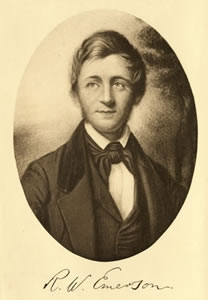
Ralph Waldo Emerson (25 mei 1803 – 27 april 1882)
De Mexicaanse dichteres en schrijfster Rosario Castellanos werd geboren in Mexico-stad op 25 mei 1925. Zie ook alle tags voor Rosario Castellanos op dit blog.
Silence Concerning an Ancient Stone
Here I am, seated, with all my words,
like a basket of green fruit, intact.
The fragments
of a thousand destroyed ancient gods
seek and draw near each other in my blood. They long
to rebuild their statue.
From their shattered mouths
a song strives to rise to my mouth,
a scent of burned resins, some gesture
of mysterious wrought stone.
But I am oblivion, treason,
the shell that did not keep from the sea
even the echo of the smallest wave.
I look not at the submerged temples,
but only at the trees that above the ruins
move their vast shadow, with acid teeth bite
the wind as it passes.
And the seals close under my eyes like
the flower under the searching fingers of a blind man.
But I know: behind
my body another body crouches,
and round about me many breaths
furtively cross
like nocturnal beasts in the jungle.
I know: somewhere,
like the cactus in the desert,
a constellated heart of spines,
it is waiting for a name, as the cactus the rain.
But I know only a few words
in the lapidary language ,
under which they buried my ancestor alive.
Vertaald door George D. Schade
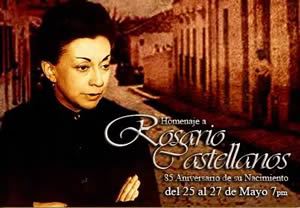
Rosario Castellanos (25 mei 1925 – 7 augustus 1974)
De Canadese dichter en schrijver Alain Grandbois werd geboren op 25 mei 1900 in Saint-Casimir, Québec. Zie ook alle tags voor Alain Grandbois op dit blog.
La Capitale déchirée
Les doux fantômes de la nuit
Précipitant l’aube
À coups redoublés
De neiges immémoriales
D’images illicites
De tourments tournant
Dans le cercle épuisé
Des destructions définitives
Créant ces musiques sournoises
Du haut des collines
Vers les horizons perdus
Mais c’est en vain
Ô beaux fantômes blancs
Ô sourds fantômes vainqueurs
La Capitale absurde et choisie
Pour ce triste bonheur
Pour cette savante défaite
Pour la suprême illumination
C’est en vain ô mes doux fantômes
Votre dur sourire
Ne saura cerner
Que vos captifs d’hier
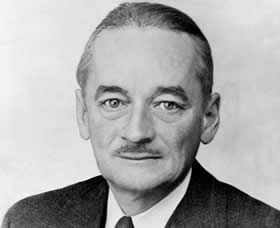
Alain Grandbois (25 mei 1900 – 18 maart 1975)
De Albanese dichter en schrijver Naim Frashëri werd geboren op 25 mei 1846 in Frashër. Zie ook alle tags voor Naim Frashëri op dit blog.
Hope
I have great hope
In God
That he will not abandon
Albania thus,
But that she will shine forth
And break into blossom.
May the day dawn
That will bestow upon us
A great light,
Giving birth to:
Civilization,
Prosperity.
Fraternity
And unity
And compassion
Are our salvation.
Happy is he who will be present
When this day comes.
When Albania
Will be radiant
And misfortune
Will be banished
Forever
From her sight.
For Albania,
Joyous days
Are at hand.
The darkness is receding.
Happy is he who will live
To see her reign!
For the Albanian
And his language
Are at one
With Albania.
Happy is he who will
Behold her soon!
Knowledge
And progress,
Goodness
And humanity
Will arise,
Never to stray.
Vertaald door Robert Elsie
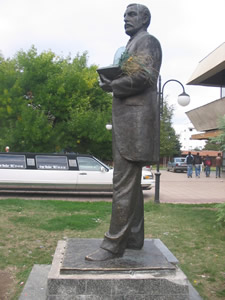
Naim Frashëri (25 mei 1846 – 20 oktober 1900)
Standbeeld in Tetovo, Macedonië
De Britse schrijver, criticus en politicus Sir Edward Bulwer-Lytton werd geboren in Londen op 25 mei 1803. Zie ook alle tags voor Edward Bulwer-Lytton op dit blog.
Uit: The Last Of The Barons
“Westward, beyond the still pleasant, but even then no longer solitary, hamlet of Charing, a broad space, broken here and there by scattered houses and venerable pollards, in the early spring of 1467, presented the rural scene for the sports and pastimes of the inhabitants of Westminster and London. Scarcely need we say that open spaces for the popular games and diversions were then numerous in the suburbs of the metropolis,–grateful to some the fresh pools of Islington; to others, the grass-bare fields of Finsbury; to all, the hedgeless plains of vast Mile-end. But the site to which we are now summoned was a new and maiden holiday-ground, lately bestowed upon the townsfolk of Westminster by the powerful Earl of Warwick.
Raised by a verdant slope above the low, marsh-grown soil of Westminster, the ground communicated to the left with the Brook-fields, through which stole the peaceful Ty-bourne, and commanded prospects, on all sides fair, and on each side varied. Behind, rose the twin green hills of Hampstead and Highgate, with the upland park and chase of Marybone,–its stately manor-house half hid in woods. In front might be seen the Convent of the Lepers, dedicated to Saint James, now a palace; then to the left, York House, [The residence of the Archbishops of York] now Whitehall; farther on, the spires of Westminster Abbey and the gloomy tower of the Sanctuary; next, the Palace, with its bulwark and vawmure, soaring from the river; while eastward, and nearer to the scene, stretched the long, bush-grown passage of the Strand, picturesquely varied with bridges, and flanked to the right by the embattled halls of feudal nobles, or the inns of the no less powerful prelates; while sombre and huge amidst hall and inn, loomed the gigantic ruins of the Savoy, demolished in the insurrection of Wat Tyler.”
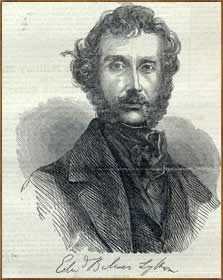
Edward Bulwer-Lytton (25 mei 1803 – 18 januari 1873)
